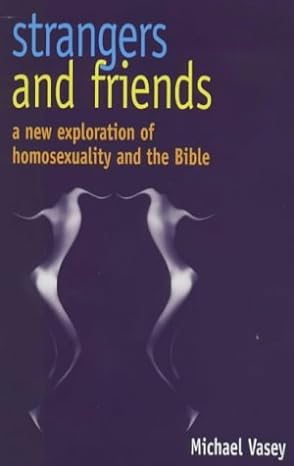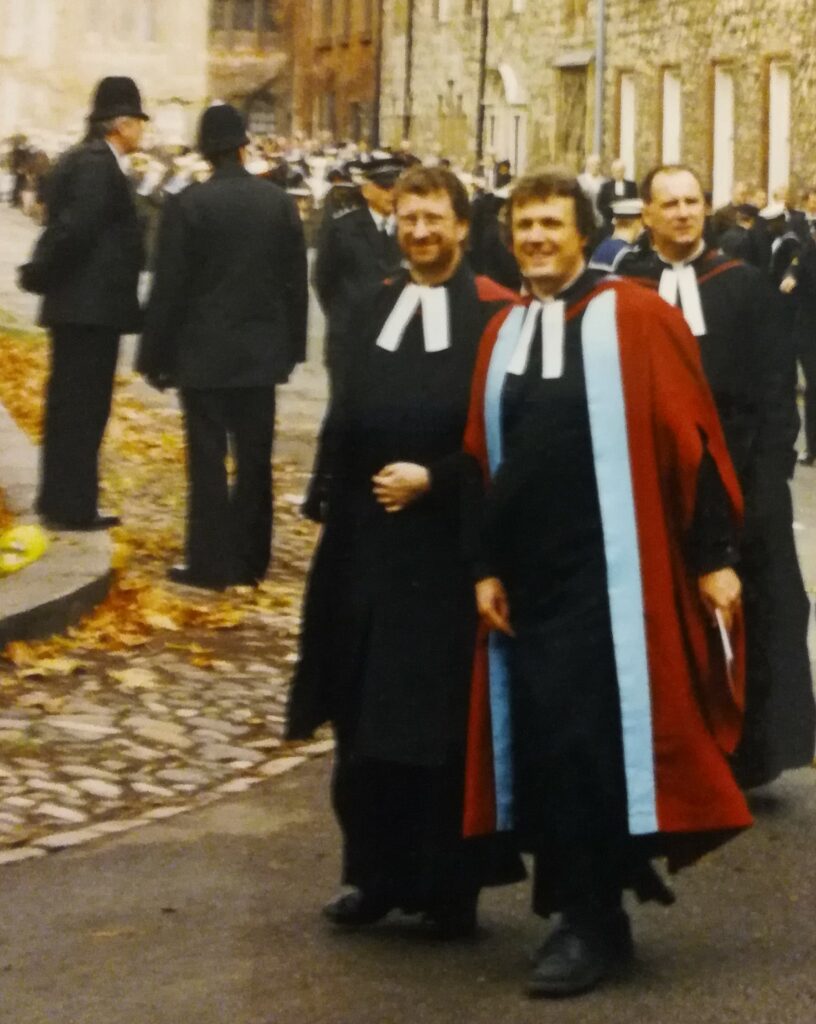Michael Vasey’s ‘Strangers and Friends’ – over 25 years later
A recent post in the Facebook group ‘Inclusive Evangelicals’ (which offers an inclusive and accepting approach to homosexuality on contradistinction to the exclusive rejection by many conservative evangelicals) discussed the book written in 1995 by the Rev’d Dr Michael Vasey, Strangers and Friends: A new explanation of homosexuality and the Bible and published by Hodder & Stoughton.

One comment referred to the fact that the author was a well-known evangelical who taught Liturgy at the theological college of Cranmer Hall, St John’s College, Durham, so the book’s launch at St Matthew’s Church, Westminster in December 1995 was quite a big event, with several representatives of the media present with cameras and notebooks. The expectant journalists were taken aback by Michael’s opening comment that “the most important issue facing the Church of England today is the renewal of the liturgy”! For Vasey himself, after his many years of scholarship and teaching, as well as his faithful service to the Liturgical Commission, this was much more crucial than the gay debate – so he seemed rather taken aback by the media interest in his book . . .
I was pleased to count Michael himself as a friend, as well as an important colleague on the General Synod of the Church of England, where we were both ‘University Proctors in Convocation’, with him representing the Universities of the Northern Province, while I served for London. We worked together on the important reform of the Lectionary, bringing the Church of England into the use of the Revised Common Lectionary (already common in the Roman Catholic church as well as the Episcopal Church of the USA). As a biblical scholar, I was very happy with the proposed concentration on a single gospel over the course of a year (Matthew in Year A, Mark in B, and Luke in C) – but Michael and I made common cause to try to get more sequential use of John’s narrative into the Lectionary also.

Photo by Jim Rosenthal
But I was also surprised to be invited a day or two later to write a full page analysis and review of the book for the Church Times. Apparently it was too hot a potato to be touched by its usual more distinguished reviewers . . . And so I knuckled down over Christmas and New Year, and duly submitted 1,500 words as requested in early January, and took the courtesy of sending Michael Vasey a copy of my text a day or two before its publication.
So I was pleased and honoured to be invited to his book’s launch at the important venue of St Matthew’s, not least because of its being also known for its excellent catering and hospitality – and we were not disappointed. What I remember of the evening was a most convivial event with excellent debate and conversation – a long way from the battle-lined row hoped for by the media.
However, while I understood that articles and reviews would be edited or trimmed, I was not expecting that the version duly printed in the next week’s issue had had some of my positive points removed, and some critical comments about Michael Vasey having made enemies, that I never wrote, had been inserted. Given that my name was in the by-line as author, this made for some interesting interactions with some of those who had been present at the book launch – though Michael himself made it clear that he was happy with my original version, and that I was not responsible for some of the published content.
That is all a long time in the past now – but it was an uncomfortable introduction to the war of words and the battles about homosexuality and the Bible and the Church which have bedevilled not only the Church of England, but all Christian denominations over the last three decades, bringing both the Church of England and the Anglican Communion to the verge of schism at various points. I was particularly involved with the Lambeth Conference in 2008, having written the Commentary on John’s gospel set by Archbishop Rowan Williams for all the bishops, as well as leading the various seminars on the Bible and homosexuality (based on my 2007 book, Imitating Jesus). I must admit that I am pleased to be no longer involved with the rancorous arguments in the General Synod as the debate and the issue has continued to be bitterly divisive.
Michael Vasey himself sadly died a few years after the book’s publication – but looking at it now after a couple of decades, I am struck once again by his eirenic tone, pleading for a reasoned debate. And the book ends with a picture of Jesus the Outsider, who according to Hebrews, “suffered outside the city gate in order to sanctify the people by his own blood. Let us then go to him outside the camp and bear the abuse that he suffered. For here we have no lasting city, but we are looking for the city that is to come” (Hebrews 13.12-13). Vasey ends with this plea: “The wider church of Christ needs to ask itself whether it is willing to follow his example” (page 250).
My review from Christmas 1995 concluded by saying “Vasey has made a great contribution to the content of this debate. This book must be wrestled with by both sides – not uncritically acclaimed nor dismissed unread. But perhaps more importantly, he has pointed a new way to the conduct of debate – in gentleness, care, and honesty. It would be a vast improvement if we all followed his lead in this respect.”
Sadly, Michael Vasey’s final sentence written over a quarter of a century ago is still a challenge to the church today, so I repeat my concluding point as I encourage you to read my review from three decades back – but more importantly “follow his lead” in our continuing debates and discussions and in the way we treat our brothers and sisters in Christ.